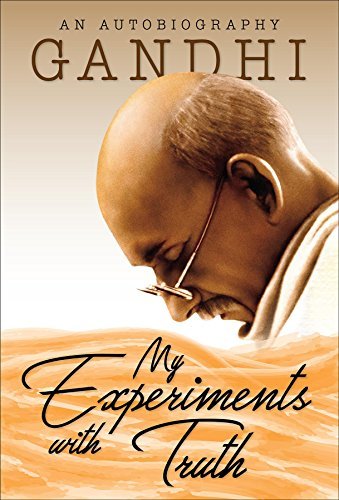What do you think?
Rate this book


The Story of My Experiments with Truth, the autobiography of Mahatma Gandhi, is a very popular and influential book. It covers the period from his birth (1869) to the year 1921, describing his childhood, his school days, his early marriage, his journeys abroad, his legal studies and practise.
The book is more about the experiments of Gandhi with truth and his Satyagraha movement, which literally means demanding the truth and nothing else. This is the very idea that helped him to fight against racism, violence and colonialism. All of this eventually helped him to achieve his dream of an independent India.
Gandhi mentions his numerous experiments, starting from his elocution training to putting an end to his fear and shyness towards public speaking. His instances of attending singing classes and shaking a leg on the dance floor are well-described. He was a staunch vegetarian, fasted regularly and walked 10 miles daily. He studied comparative religion greatly and was a devote Hindu, but showed great respect for all religions. Gandhi didn't shy away from accepting his own mistakes and displayed commendable patience and fortitude in his personal life.
About the Author:
Mohandas Karamchand Gandhi, was the prominent figure in the freedom struggle in India from the British rule. He is also known as the 'The Father of the Nation', in India.
The author has written a number of books and some of them include Character & Nation Building, India of My Dreams, and All Men are Brothers.
The author was born on the 2nd of October, 1869, in Porbandar, Gujarat. In the year 1942, he played a key role in launching the Quit India movement, which was intended at forcing the British to leave the nation. As a result of launching this movement, he was thrown in prison and remained there for several years, due to other political offenses allegedly committed by him. At all times, he practised satyagraha, which is the teaching of non-violence. As the British rule ended, he was saddened by India's partition, and tried his best to bring peace among the Sikhs and Muslims. On the 30th of January, 1948, Mahatma Gandhi was shot dead by a Hindu nationalist, for allegedly being highly concerned about the nation's Muslim population.
677 pages, Kindle Edition
First published January 1, 1927

Martin Luther King, Jr.
Albert Einstein
Aung San Suu Kyi
Barack Obama
Nelson Mandela
Dalai Lama
John Lennon
Steve Jobs
Rabindranath Tagore
Pearl S Buck
Ho Chi Minh
George Bernard Shaw
 Narrator - Bill Wallace
Narrator - Bill Wallace  Gasp! And there he was, meeting teh Blavatsky and Annie Besant...
Gasp! And there he was, meeting teh Blavatsky and Annie Besant..."I might [=could] not take cow's or buffalo's milk, as I was bound by a vow. The vow of course meant the giving up of all milks, but as I had mother cow's and mother buffalo's only in mind when I took the vow, and as I wanted to live, I somehow beguiled myself into emphasizing the letter of the vow, and decided to take goat's milk"
"I will not say that I was indifferent to their literary education, but I certainly did not hesitate to sacrifice it. My sons have therefore some reason for a grievance against me. Indeed they have occasionally given expression to it, and I must plead guilty to a certain extent."
"Only this much I knew--that under ideal conditions, true education could be imparted only by the parents, and that then there should be the minimum of outside help; that Tolstoy Farm was a family, in which I occupied the place of the father; and that I should so far as possible shoulder the responsibility for the training of the young."
"I succumbed. My intense eagerness to take up the Satyagraha fight had created in me a strong desire to live, and so I contented myself with adhering to the letter of my vow only, and sacrificed its spirit.[...] The will to live proved stronger than the devotion to truth, and for once the votary of truth compromised his sacred ideal by his eagerness to take up the Satyagraha fight."
"So convenient a thing is it to be a reasonable creature , since it enables one to find or make a reason for everything one has a mind to do."
“My life from this point onward has been so public that there is hardly anything about it that people do not know.”
I understand more clearly today what I read long ago about the inadequacy of all autobiography as history. I know that I do not set down in this story all that I remember. Who can say how much I must give and how much omit in the interests of truth? And what would be the value in a court of law of the inadequate ex parte evidence being tendered by me of certain events in my life? If some busybody were to cross-examine me on the chapters already written, he could probably shed much more light on them, and if it were a hostile critic’s cross-examination, he might even flatter himself for having shown up ‘the hollowness of many of my pretensions’.
But it is not my purpose to attempt a real autobiography. I simply want to tell the story of my numerous experiments with truth, and as my life consists of nothing but those experiments, it is true that the story will take the shape of an autobiography. But I shall not mind, if every page of it speaks only of my experiments. I believe, or at any rate flatter myself with the belief, that a connected account of all these experiments will not be without benefit to the reader.